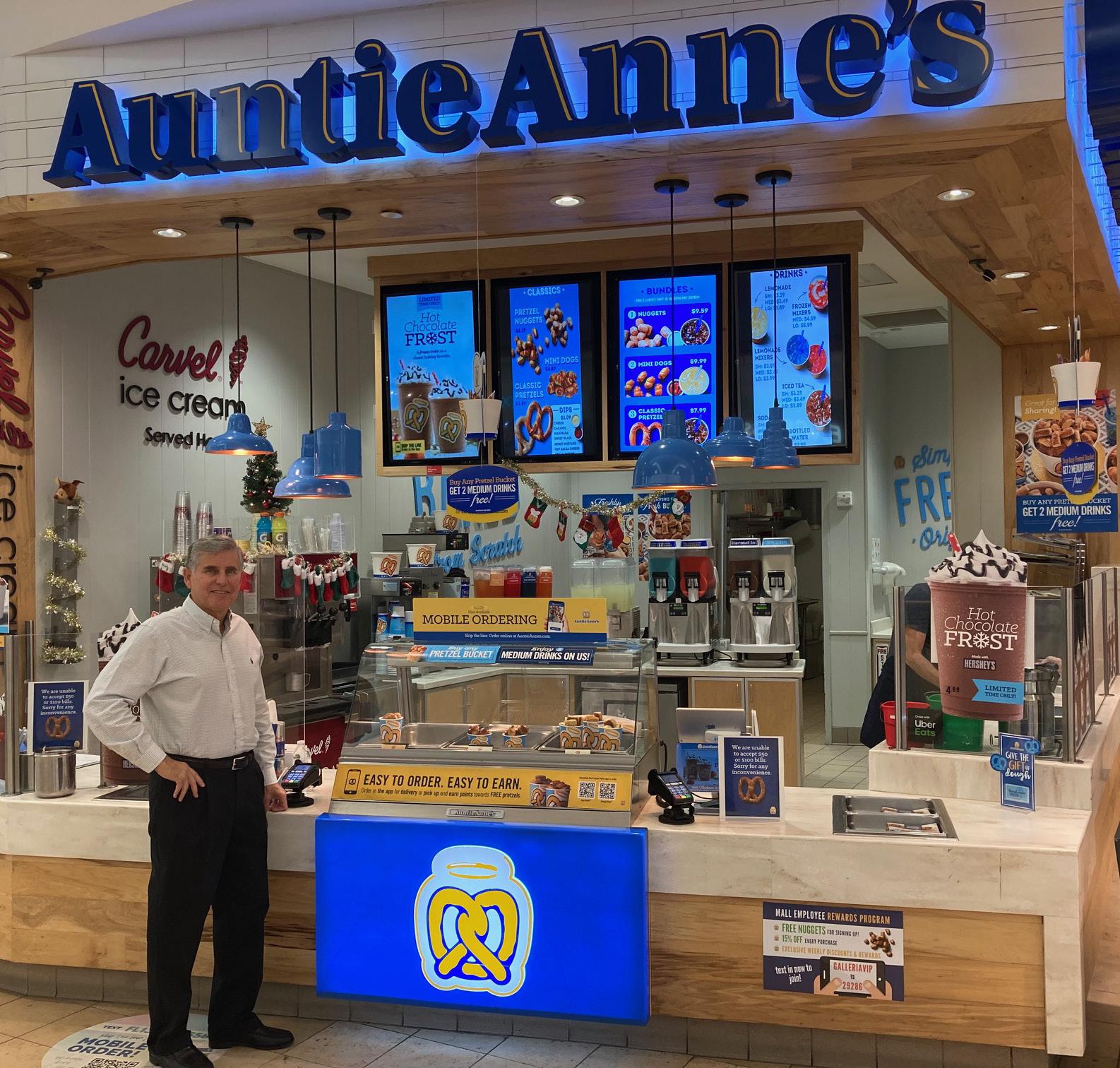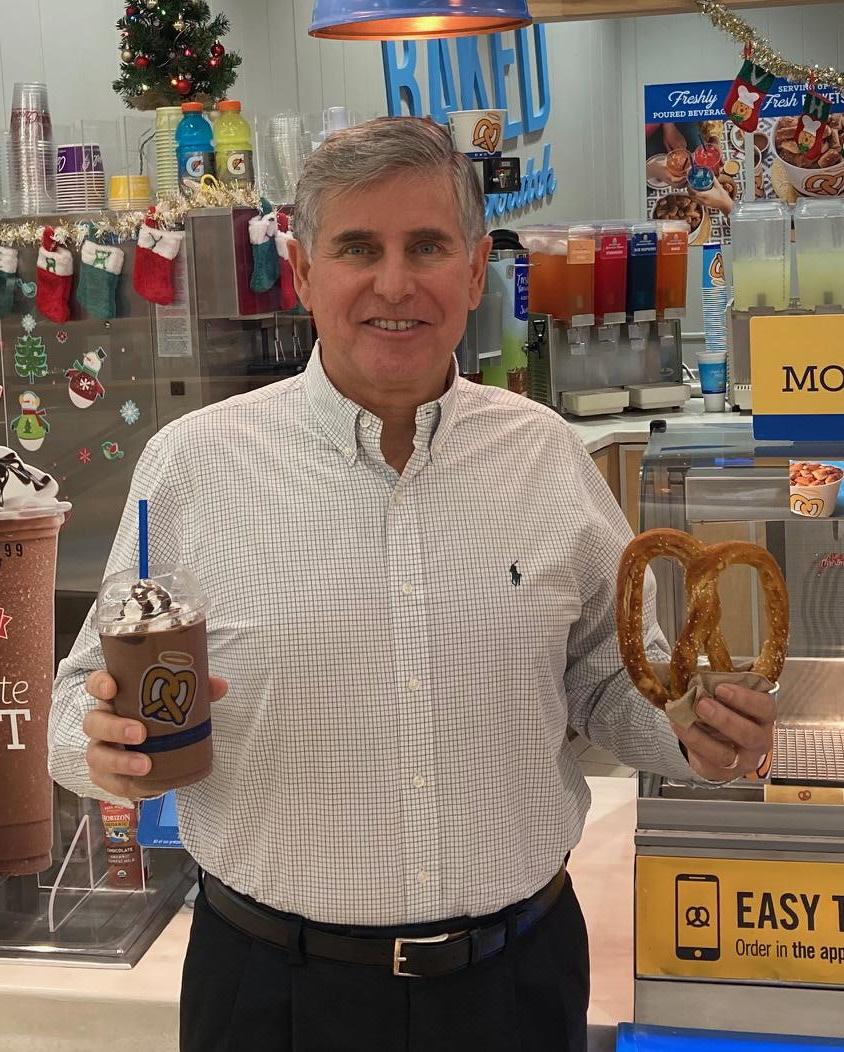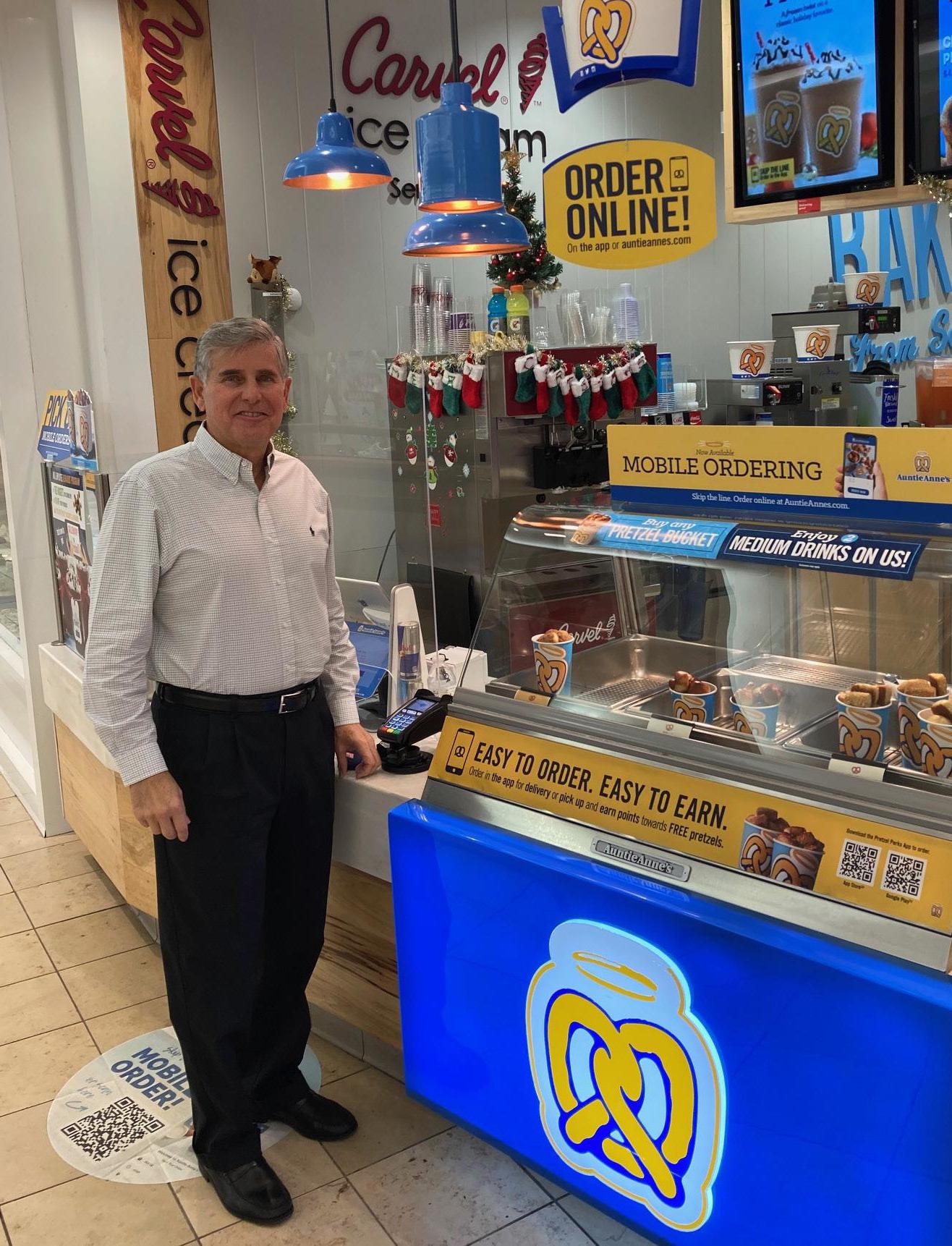
10 minute read
Counting His Own Beans
Halfway to 100 with 3 brands
Written By KERRY PIPES
Luis San Miguel is halfway to his next big goal of operating 100 franchise units. The president and CEO of Fresh Dining Concepts oversees a total of 50 Auntie Anne’s, Cinnabon, and Carvel locations across New York, Florida, and Pennsylvania.
At 61, San Miguel has a diverse business background and a successful history in franchising. He has been a financial manager and CFO, worked at Burger King Corp., been a Burger King franchisee, and is now a franchisee of Auntie Anne’s, Cinnabon, and Carvel. His Coral Gables, Florida-based Fresh Dining Concepts is the third-largest Auntie Anne’s operator in the country. Before becoming a franchisee with Auntie Anne’s and Cinnabon, San Miguel was CEO of Toms King, a company with a portfolio of 58 Burger Kings and annual revenue of $70 million.
“I could have continued my career as a financial professional,” he says of his early career. “But I developed a desire to lead an organization and not just count other people’s beans but to create my own beans.”
San Miguel was born in Cuba and emigrated to the U.S. with his family when he was 9. He overcame language and cultural barriers to graduate college and build a successful business career, at one point serving as CFO of a company with annual revenues of more than $700 million.
Coming off 2020 and the effects of the pandemic, San Miguel is looking forward to adding new units and growing thirdparty delivery and catering sales in 2021. He says he’s happy with his three current brands and their solid unit-level economics, which is why he plans to keep his focus squarely on growing those brands.
Always looking for ways to improve, San Miguel says he wants to do a better job delegating authority to his team. “I value my team’s opinions and seek to get their buy-in, but my tendency is to assume the lead on important matters.”
Expect him to move aggressively through 2021 focusing on building sales, managing costs, and uncovering development opportunities with solid ROI potential on his way to 100.
PERSONAL
First job: Auditor with KPMG. Subsequent to that, I held various financial management positions with companies in various industries including technology, travel, and retail. Most notably, I worked at Burger King Corp. After that, I became a Burger King franchisee and subsequently an Auntie Anne’s, Cinnabon, and Carvel franchisee. Formative influences/events: I was born in Cuba and emigrated to the United States with my family when I was 9 years old. I still remember the challenge of learning a new language, which created struggles in school. I am grateful for the warm welcome my family and I received from the United States, and in particular, the community in Miami. I’m also grateful for the educational and professional opportunities made available to me. I received my college degree from Fordham University in New York. Living on my own in New York exposed me to multiple cultures and ethnicities and helped me develop my leadership and communication skills. Key accomplishments: Becoming a father, completing an IPO on the Nasdaq. Biggest current challenge: Finding high-quality development opportunities at reasonable prices to achieve ROI objectives. Next big goal: Reaching 100 units (a doubling of current unit count). First turning point in your career: Leaving KPMG was not a decision that I initiated, and it helped me realize that I needed to take charge of my career and not just rely on corporate processes for progression. Best business decision: I had a successful career as a finance professional and CFO and completed a number of public and private equity and debt financings. I could have continued my career as a financial professional. But over the years I developed a desire and confidence in my ability to lead the entirety of an organization and not just count other people’s beans, but rather create my own beans. I decided to pursue franchising deals, which was very difficult in terms of finding quality deals and obtaining financing, but in the end I was able to achieve my goals. Hardest lesson learned: My first franchise transaction was much greater in value than I anticipated. As a result, I partnered with a capital source I was unfamiliar with just to be able to complete the deal. That decision turned out to be a mistake as my partner and I did not have similar goals or perspectives and had to sever the partnership after little more than a year. Lesson learned: Take the time to know your prospective partners and don’t be afraid to ask hard questions up front to ensure there is real common ground. Work week: I’m in the office every weekday when I am not traveling because I believe interaction with my employees is very important. I am in contact with my management team as necessary during weekends. Exercise/workout: I try to exercise 5 days a week, a combination of light weights, running, and core exercises. I also enjoy golf and skiing. Best advice you ever got: “God grant me the serenity to accept the things I cannot change, the courage to change the things I can, and the wisdom to know the difference.” How do you balance life and work? Work is an important part of my life. It helps me use skills I have developed over the years as well as develop new skills. I enjoy the intellectual reward of overcoming challenges in the workplace. Guilty pleasure: All sweet things, especially ice cream. Favorite movie: “The Lion King.”

Company: Fresh Dining Concepts Units: 40 Auntie Anne’s, 2 Cinnabon, 6 co-branded Auntie Anne’s/ Cinnabon, 2 co-branded Auntie Anne’s/Carvel Family: Wife, 2 sons, 1 granddaughter Years in franchising: 10 Years in current position: 5
What do most people not know about you? I enjoy singing and was a member of the choir in college.
What did you want to be when you grew up? A cowboy. Last vacation: Skiing in Utah.
Person I’d most like to have lunch with: Vince Lombardi.
MANAGEMENT
Business philosophy: Assume responsibility and be accountable for your actions and inactions. Management method or style: “Benevolent dictator.” I am strong-willed, but I also value my team’s opinions and seek to get their buy-in on conclusions I reach or decisions I make. Greatest challenge: Delegating important decisions. I realize that delegating authority is an important part of developing my subordinates, but my tendency is to assume the lead on important matters. How do others describe you? Energetic at all times, thorough in my review of others’ work, and direct in my communications. One thing I’m looking to do better: Bring more positivity to work, be more focused on gratitude for the blessings I have received and for the efforts of my colleagues.
How I give my team room to innovate and experiment: My operations team develops local marketing and promotional programs, as well as variable compensation programs for our store-based associates. How close are you to operations? We have an excellent operations team. Our COO and directors have long tenure with the brands, and I rely on them for day-to-day operating decisions. As it relates to operations, my focus is on strategic matters such as building sales or long-term labor cost management.
What are the two most important things you rely on from your franchisor? Brand awareness and menu development. As a franchisee, we just don’t have the capability or bandwidth to effectively address these important topics. However, all three of my franchisors are excellent partners in this regard. What I need from vendors: I truly believe that to be successful, one must strive to achieve a “win-win” situation with one’s vendors. In that regard, I always try to achieve the proper balance between price and service. I am a loyal customer to those vendors able to deliver the best goods and services at a competitive price. I am not interested in being the “loss leader” for any of my vendors.
Have you changed your marketing strategy in response to the economy? How? Yes. We have begun to invest in digital marketing as a means of increasing awareness for our third-party delivery and catering capabilities. In this regard, we have effectively piggybacked on the efforts of Auntie Anne’s, Cinnabon, and Carvel. How do you train and retain? The bulk of our training is hands-on with direct supervision. This is true at the store level as well as for the administrative staff. At the store level, we also leverage operational e-learning modules developed by Auntie Anne’s and Cinnabon to ensure we are executing brand standards and making delicious products our guests know and love and have come to expect from our brands.
How do you deal with problem employees? I believe in proper coaching and continuous feedback for all employees. We will always try to develop an employee who is struggling, and will tend to give them more opportunities if they demonstrate sincere effort in improving. Having said that, there is a limit to our attempts to improve performance. Fastest way into my doghouse: Indifference, lack of effort or commitment.
COVID-19 What are the biggest impacts of Covid-19 on your business? All mall-based businesses are obviously struggling with decreased foot traffic, but I see this issue as one that will be overcome with the development of new drugs and treatments in the near future. I believe our biggest long-term issue is on the labor side. We are having a very difficult time attracting and retaining crew members. This is probably due to a number of factors, including the virus and the negative impact that the government’s stimulus and unemployment subsidies have had on our ability to compete for people. How have you responded? We have revised our way of operating to rely on fewer crew hours than before. It is very difficult to achieve greater labor efficiency, especially with all the new health requirements, so we are also testing self-order kiosks and promoting ordering through our mobile platforms to increase efficiency on the order side.
What changes do you think will be permanent? Regardless of government mandates, attention to healthy practices and cleanliness is here to stay and rightfully so. This is an area where I think Auntie Anne’s, Cinnabon, and Carvel have always been leaders; cleanliness has always been a top priority for these brands.
BOTTOM LINE Annual revenue: $40 million-plus. 2021 goals: Increase unit count by 20 units, grow third-party delivery and catering sales to 5% of total sales.
Do you have brands in different segments? Why/why not? At our current size, we find that we are better off leveraging our operations knowledge base in the concepts we already know. The unit-level economics for the brands we operate also make a compelling case to “stay in our lane.”
Are you experiencing economic growth in your markets? We operate exclusively in malls. As a result, all of our stores were closed for at least a two-month period. In the case of our Metro NYC stores, we were closed for up to five months. Having a geographically diverse group of stores allowed us to start reopening and generating sales sooner rather than later. However, there were no practical growth opportunities during the closure period or in the immediately subsequent months as sales were down significantly. In addition, many of our crew members are students who still live with their parents. Rehiring and sourcing new crew members has been difficult because in many cases the parents are concerned about the health implications of their children going back to work, which has limited our ability to quickly reopen stores.
How do you forecast for your business? Anyone experienced in the direct-to-consumer retail business will tell you that trying to forecast customer behavior is impossible. People’s behavior can change erratically from one day to another. So we forecast in monthly periods, which tends to smooth out day-to-day variability in customer behavior.
What are the best sources for capital expansion? Our capital partners have always been private equity firms. We are able to leverage their financial connections and expertise and appreciate the discipline they have in evaluating growth opportunities.
How do you reward/recognize top-performing employees? We are always trying to identify the best-performing employees with the intent of creating opportunities for their promotion and advancement. We have many examples of crew members who later became store managers. One of our regional directors was initially a store manager. We also run periodic contests that provide bonus opportunities and recognition in our quarterly company newsletter.
What kind of exit strategy do you have in place? For me personally, the best exit strategy is to have an effective and competent management team that makes me expendable, and I think we already have that in place. Having said that, I enjoy what I do and don’t have any near-term exit plans.







